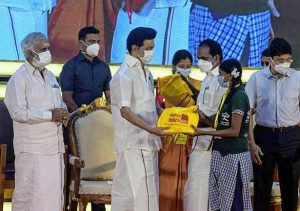Meendum Manjappai’ Scheme: Tamil Nadu

Tamil Nadu Chief Minister M.K. Stalin has launched the ‘Meendum Manjappai’ campaign aimed at creating awareness on the usage of cloth bags instead of single-use plastic bags.
- The Tamil Nadu government has already banned 14 types of plastic materials.
- The government also needs to address important structural issues such as policies to regulate the use of plastic alternatives, improve recycling and have better waste segregation management.
- In addition to improving recyclability, investment in research and development for alternatives should also be a priority.
- Single-use plastics refer to disposable items like grocery bags, food packaging, bottles and straws that are used only once before they are thrown away, or sometimes recycled.
- As plastic is cheap, lightweight and easy to produce, it has led to a production boom over the last century, and the trend is expected to continue in the coming decades, according to the United Nations.
- But countries are now struggling with managing the amount of plastic waste they have generated.
- About 60% of plastic waste in India is collected — that means the remaining 40% or 10,376 tons remain uncollected
- In 2019, the Union government in a bid to free India of single-use plastics by 2022, had laid out a multi-ministerial plan to discourage the use of single-use plastics across the country.
- A government committee has identified the single use plastic (SUP) items to be banned based on an index of their utility and environmental impact. It has proposed a three-stage ban:
- The first category of SUP items proposed to be phased out are plastic sticks used in balloons, flags, candy, ice-cream and ear buds, and thermocol that is used in decorations.
- The second category, proposed to be banned from July 1, 2022, includes items such as plates, cups, glasses and cutlery such as forks, spoons, knives, straws, trays; wrapping and packing films used in sweet boxes; invitation cards; cigarette packets; stirrers and plastic banners that are less than 100 microns in thickness.
- A third category of prohibition is for non-woven bags below 240 microns in thickness. This is proposed to start from September next year.




